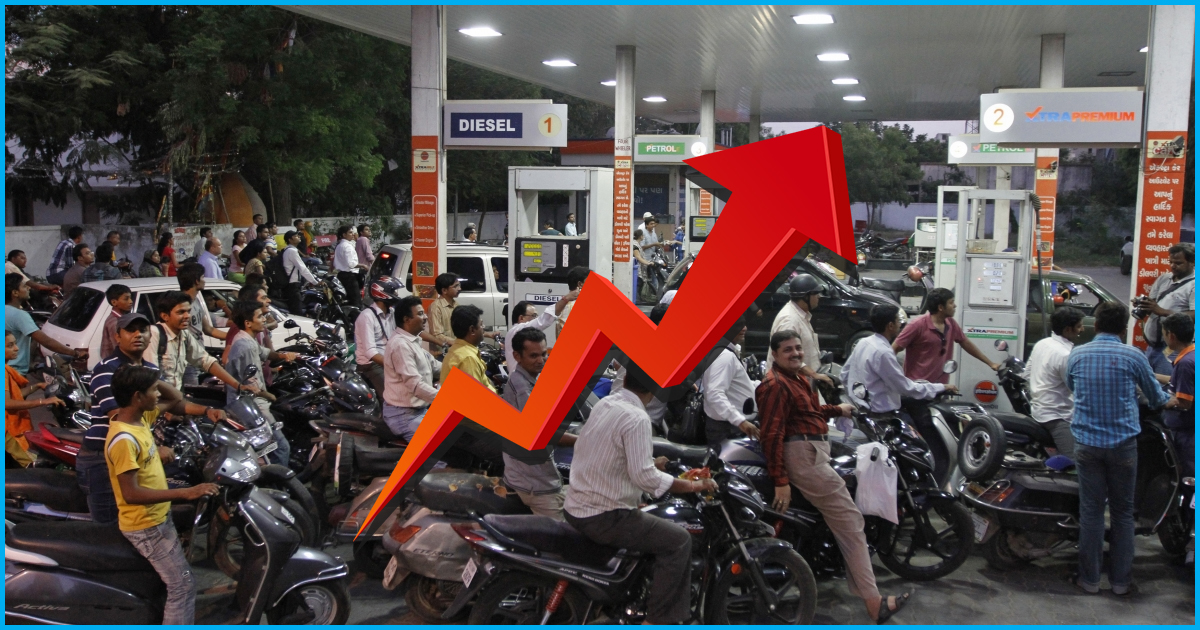
Petrol Prices Reached Rs 79.99 Per Litre In Delhi, Govt Says No To Cutting Excise Duty
7 Sep 2018 3:20 PM GMT
For the second consecutive day on September 7, the fuel prices have touched a record high with petrol prices rising to Rs 79.99 per litre in the national capital and Rs 87.39 per litre in Mumbai. Meanwhile, Diesel prices, increased by Rs 0.52 per litre (Rs 72.07 per litre) in Delhi and by Rs 0.55 per litre (Rs 76.51) in Mumbai today. Prices of petrol and diesel which were continuously hiked for the last ten days till September 4, remained unchanged on Wednesday, September 5.
Govt will not cut excise duty on fuel prices
Even in the wake of such sky-high fuel prices, the government will not cut excise duty on petrol and diesel, as it has limited fiscal space to take any blow to the revenue collections, reported the Times Of India. An official told the daily that the government cannot, “disturb fiscal maths by cutting excise duty on petrol and diesel.” On September 5, Finance Minister Arun Jaitley, too, said that the international oil prices remained volatile and have not shown any linear movement and hence, the government remains non-committal on cutting excise duty, reported the daily.
It must be noted that fuel prices, half of the retail selling prices of which are made up of central and state taxes, has been on the rise since mid-August. The reasons for the same is mainly two-fold: drop in the value of rupee and rise in crude oil prices. Since the start of daily price revisions in June 2017, this is the first time that fuel prices have risen by such unprecedented amounts in a fortnight’s time.
The relentless price hike has once again brought the question of the government cutting excise duty to the fore. However, according to the daily, an official in the Finance Ministry had said, “We already know that there will be a hit on current account. Knowing that we can’t disturb the fiscal deficit, we should rather be fiscally prudent.” Fiscal deficit means that the expenditure is higher than income, while Current Account Deficit (CAD) is defined as the difference between inflow and outflow of foreign currency.
According to BloombergQuint, credit rating agency Moody’s Investors Service said that India has higher risks of breaching the 3.3% budgeted fiscal deficit of the GDP for the fiscal year of 2018-19, owing to higher oil prices which will add to short-term fiscal pressures. It also said that the current account deficit is expected to widen to 2.5% of the GDP by the year-end in 2019, which will be 1% more than the previous fiscal.
Rising crude oil price cannot be blamed
Following this, the blame game has once again begun. Former Finance Minister, P Chidambaram, while coming down heavily on the excessive tax rates on fuel prices said that if taxes are cut, prices will come down significantly. While rising crude oil prices is being posed as one of the reasons behind increasing prices, reportedly, the crude oil prices between the years 2011 to 2013 crossed the $100 mark. Petrol prices in 2013 also soared, crossing Rs 76 per litre. While the crude oil prices are much lower than what it was in 2013, taxes on petrol and diesel have increased manifold over the years, thereby, raising its prices to new highs.
How is fuel taxed?
Close to half of the fuel prices that we pay is made up of taxes. While the central government levies the excise duty, sales tax or VAT is levied by the states which vary. Presently, centre levies a total of Rs 19.48 per litre of excise duty on petrol and Rs 15.33 per litre on diesel. The VAT levied by Andaman and Nicobar is the lowest at 6%. Additionally, prices in Delhi are the cheapest among all metros mainly due to lower VAT rates, and Mumbai has the highest VAT on petrol at 39.12%.
Reportedly, the central government, in nine instalments between November 2014 and January 2016 had increased excise duty on petrol by Rs 11.77 a litre and that on diesel by Rs 13.47 a litre to support finances when the global oil prices fell. However, ever since then, the central government has cut excise duty by Rs 2 per litre in October last year. After this, the centre’s excise duty collection on petroleum products has doubled over the last four years.
With the USA’s sanctions on Iran- India’s second-biggest oil exporting country, ready to kick in from November 1, petroleum prices may continue to soar as international markets fall under pressure.
Also Read: Petrol Price Rises To Rs 84.70 In Mumbai; Why Are Fuel Prices Skyrocketing In India?
 All section
All section













